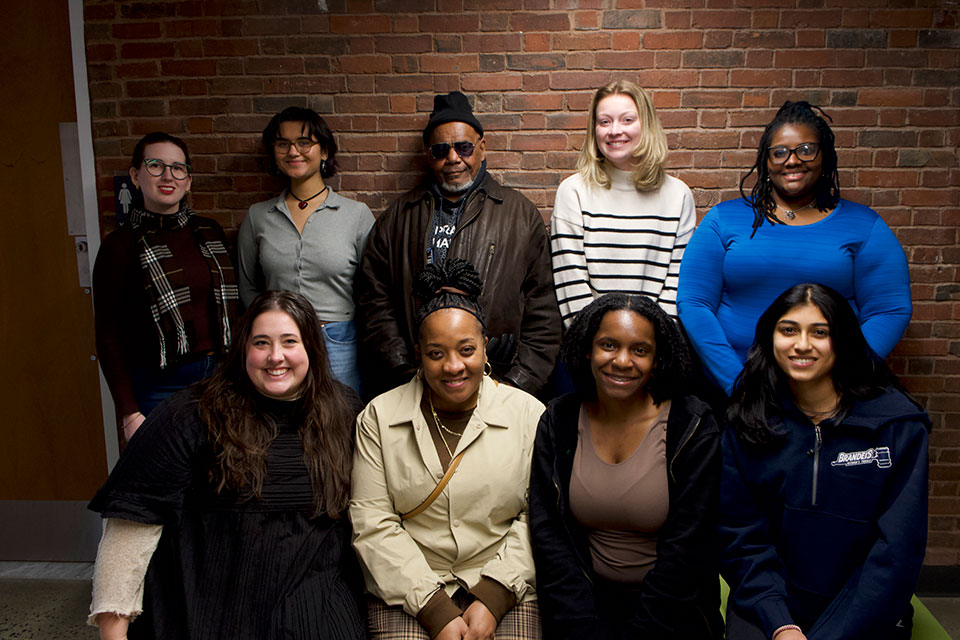Breaking Barriers with Adah Anderson
Senior Adah Anderson ’24 reflects on her senior thesis, the inspirations behind the topic she chose, and the impacts it has on her desired career.
By Ella Subramanian
 Adah Anderson ’24
Adah Anderson ’24
During the second half of her college experience, Adah Anderson ’24 embarked on an academic undertaking that would have a tremendous impact on her future career, her senior thesis titled “Examining Re-entry in Massachusetts: Perspectives from System-Impacted People and Those Working in Re-entry.”
Adah, who is majoring in politics and sociology, says that she has always been interested in criminal justice, but it was her involvement with the Partakers Empowerment Program (PEP) that convinced her to write a thesis about incarceration. She was introduced to PEP through the Brandeis Educational Justice Initiative (BEJI) co-founder, Professor Rosalind Kabrhel, and applied during the summer before her senior year. Adah, who is currently working in her third cohort with PEP had this to say about the program: “I’ve always had a deep passion for criminal justice reform and knew that more needed to be done…through working with PEP I have seen more clearly the traumatic effects of prison on those who are returning to society.” Based on these experiences with PEP, Adah decided on her senior thesis topic: opinions regarding the success of re-entry.
 Adah Anderson with the Partakers PEP facilitator team. From left to right: Kim Pate, Liz Peterson, Nemma Kalra, Angie Jefferson, Dawud Abdul-Basir, Jalyn Allen, Adah Anderson, Yamiley Mathurin, Ella Subramanian
Adah Anderson with the Partakers PEP facilitator team. From left to right: Kim Pate, Liz Peterson, Nemma Kalra, Angie Jefferson, Dawud Abdul-Basir, Jalyn Allen, Adah Anderson, Yamiley Mathurin, Ella Subramanian
After initial research, Adah discovered that academic discourse excludes individuals who are system-impacted, which inspired her to take on the difficult task of gathering the opinions of those who are currently incarcerated for her thesis. Alongside the incarcerated population, she chose to interview individuals who were formerly incarcerated as well as people who work in the space of re-entry. Her biggest challenge during her research was accessing those who are currently incarcerated. While attempting to access individuals inside the Department of Correction (DOC) facilities, Adah noticed that rules regarding visits and phone calls were severely restrictive. For example, she was only allowed to visit one person in the entire system within a quarterly period. “They also have numerous restrictions on incarcerated peoples’ ability to call those on the outside, such as limiting the number of people on their ‘call list’ and requiring both the person on the inside and outside to undergo a lengthy approval process just to talk over the phone.” Due to such restrictions, she talked to a few individuals over the phone, while everyone else over email. Despite obstacles put forth by the DOC, Adah is glad she continued her project because of the lack of research regarding incarcerated people in academia.
 Adah Anderson at the PEP birding walk event alongside Brandeis students and PEP participants.
Adah Anderson at the PEP birding walk event alongside Brandeis students and PEP participants.
Throughout the process, Adah notes that her thesis would not have been possible without the help of the formerly/currently incarcerated people. Her connections with individuals in PEP helped her get established with individuals who are actively working to reform the re-entry process. Additionally, even though the restrictions prevented Adah from accessing those inside facilities, she’s grateful that individuals were willing to communicate with her, even if it was through email. “Undoubtedly, the proudest moment of my thesis work has been establishing connections with those who are currently incarcerated.” She continues, “I have formed strong friendships with these individuals and continue to speak and email with them even though I have concluded our interviews.”
Despite enduring so much, Adah recognizes the strength and kindness these individuals have shown her, and she lists them as motivation for continuing this work in the future. “From speaking with those on the inside, it is clear that people committed to reforming the system are needed in positions of power and within the legal system, and it’s hard to imagine better motivation for sticking with this career path than being told by multiple people inside that they hope I do so.” After graduation, Adah plans to continue advocating for incarcerated populations by attending law school to become a prisoner’s rights lawyer.